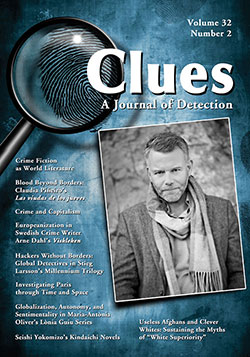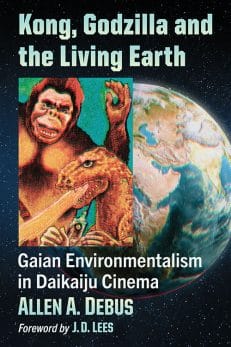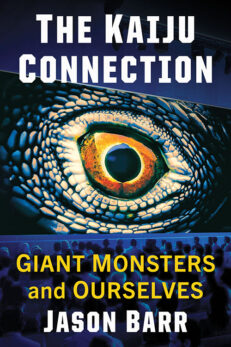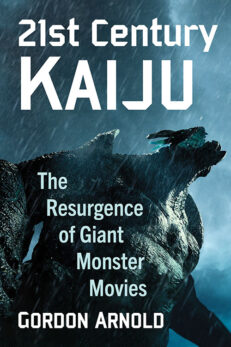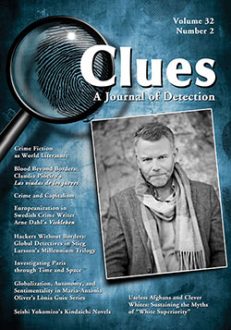Clues: A Journal of Detection, Vol. 32, No. 2 (Fall 2014)
Print Back Issue$30.00
In stock
About the Book
BACK ISSUE
This is a single back issue only. To order a current subscription, or for more information, please visit the journal’s web page at CluesJournal.com. Back issues from earlier volumes of Clues are available for order subject to availability. Also, single issues of the current volume may be ordered one at a time. Individuals may order back issues directly from our online catalog, and the charge for individuals is $30 (excluding postage). Issues from Volume 33 to the present are also available in ebook format on Kindle, Nook and Google Play.
The charge for single issues for institutions is $75 per issue (excluding postage). If your institution requires a back issue, please contact us to order at the appropriate rate.
About the Author(s)
Bibliographic Details
Executive Editor Janice M. Allan
Managing Editor Elizabeth Foxwell
Consulting Editor Margaret Kinsman
Format: softcover (7 x 10), back issue
Pages: 136
Bibliographic Info:
Copyright Date: 2014
ISSN 0742-4248
Imprint: McFarland
Table of Contents
Theme Issue: Global Crime Fiction
Guest Editors: Stewart King and Stephen Knight
The Challenge of Global Crime Fiction: An Introduction
Stewart King and Stephen Knight 5
The coeditors of the global crime-fiction issue provide an overview of its Table of Contents.
Crime Fiction as World Literature
Stewart King 8
This article explores crime fiction within a world-literature framework. It
argues that the study of national traditions can blind us to the dialogue across borders and languages between texts and authors. It proposes a reading practice that aims to develop a more nuanced understanding of this truly global genre.
Beyond National Allegory: Europeanization in Swedish Crime Writer Arne Dahl’s Viskleken
Kerstin Bergman 20
Swedish crime fiction is experiencing a strong move toward Europeanization; increasingly more novels are set in Europe and discuss European identities and transnational criminality. The author examines how national and European perspectives clash and interact in Arne Dahl’s Viskleken (Chinese Whispers, 2011), a novel featuring a multinational police team within Europol operating across borders.
Hackers Without Borders: Global Detectives in Stieg Larsson’s Millennium Trilogy
Nicole Kenley 30
The article argues that Stieg Larsson’s Millennium Trilogy is a response to the challenges of mediating digital crime. It suggests that as the technological aspects of global crime threaten to dissolve national borders, Larsson’s novels offer the computer hacker as a detective figure capable of partially managing these emerging threats.
Globalization, Autonomy, and Sentimentality in Maria-Antònia Oliver’s Lònia Guiu Series
Melissa M. Culver 41
This article examines the roles of globalization, autonomy, and sentimentality in Maria-Antònia Oliver’s Lònia Guiu detective series. This analysis focuses on narrative effects—exploitative sexism, ubiquitous violence, the construction of autonomy, and sentimentality—to explain the shaping of a production that
interrogates the relationship between global crime and local victimhood.
Crime and Capitalism: Giorgio Scerbanenco’s and Massimo Carlotto’s Italian Domestication of American Hard-Boiled Crime Fiction
Barbara Pezzotti 51
The novels of Giorgio Scerbanenco and Massimo Carlotto represent the most self-conscious meditations about the relationship between capitalism and criminality within Italian crime fiction. In the 1960s Scerbanenco pointed at the capitalistic structure of organized crime, whereas in the 1990s Carlotto showed how capitalism had assumed the typical features of the mafia.
In the Footsteps of Léo Malet: Investigating Paris Through Time and Space
Jean Anderson 62
Léo Malet’s Nouveaux mystères de Paris (1954–59) that feature wise-cracking private detective Nestor Burma have inspired writers such as Cara Black, Patrick Pécherot, Noël Simsolo, and Roland C. Wagner. The author looks at work by these Malet-influenced authors to evaluate the adjustments required to meet very different reader expectations.
Useless Afghans and Clever Whites: Sustaining the Myths of “White Superiority” in Early–Twentieth-Century Australian Crime Fiction
Erin Claringbold 71
This article explores how early–twentieth-century Australian crime fiction responded to the perceived economic and racial threat of the “Afghan” cameleers by acting as a literature of fantasy fulfillment wherein myths of white superiority and nation building were sustained through the cameleers’ portrayal as both “deviant and absent,” most notably manifesting in the figure of the “fake Afghan.”
Blood Beyond Borders: Claudia Piñeiro’s Las viudas de los jueves
Carolina Miranda 79
Claudia Piñeiro’s novel rewrites the traditional locked-room mystery by
relocating a crime that rattles the peace of a gated community, exposing various social ills that are, arguably, the product of the short-lived economic boom of 1990s Argentina. Furthermore, it problematizes the dialectics of “Civilization and Barbarism” in a post–9/11 Buenos Aires.
Inheriting the Nation: Seishi Yokomizo’s Kindaichi Novels
Chiho Nakagawa 90
This article argues that the early Detective Kindaichi novels by Seishi Yokomizo offer an analysis of Japanese culture and society after World War II. The murders for inheritance set in the countryside assume a particular significance as an exploration of suitable inheritors of the nation after the devastating defeat of World War II.
Editor’s Note: Looking to the Future
Janice M. Allan 101
The executive editor discusses what’s coming up in future issues of Clues.
ESSAYs
“Every Healthy Englishman Longed to Kick Him”: Masculinity and Nationalism in Agatha Christie’s Cards on the Table. J. C. Bernthal 103
Agatha Christie’s detective fiction offers a famously self-conscious approach to topical concerns. This article considers nationalism and masculinity in Christie’s prose. Focusing on the detective Hercule Poirot as well as Cards on the Table (1936)—a tightly plotted novel with an “oriental,” sexually ambiguous victim—it explores self-conscious presentations of race and gender.
“We’re All Strangers”: Postwar Anxiety in Agatha Christie’s The Mousetrap. Jessica Gildersleeve 115
Agatha Christie’s play, The Mousetrap (1952), disturbs the middlebrow, middle-class conventions of Golden Age detective fiction. By introducing an explicit suspicion of personas and roles, Christie’s play points to a postwar anxiety that wartime freedom undermined the capacity for surveillance, putting citizens—especially women—at risk.
Call for Papers, Reappropriating Agatha Christie 124
BOOK REVIEWS
Rebecca Martin, Ed. Crime and Detective Fiction. Pamela Bedore 125
Bill Alder. Maigret, Simenon and France: Social Dimensions of the Novels and Stories. Christopher K. Coffman 127
Drewey Wayne Gunn. The Gay Male Sleuth in Print and Film: A History and Annotated Bibliography. New ed. Alexander N. Howe 129
Sarah Weinman, Ed. Troubled Daughters, Twisted Wives: Stories from the Trailblazers of Domestic Suspense. Leonard Cassuto 131
Clues Index, Volume 32 133
Author Guidelines are on page 136
Book Reviews & Awards
- “Clues is a must-have for readers and writers of crime fiction. Scholarly, thought-provoking, wide-ranging in its topics, Clues covers the crime and thriller map.”—Sara Paretsky
- “A. Conan Doyle, notoriously resentful of Sherlock Holmes’s success, liked to scorn ‘police romances’ as less significant and worthy of his talents than his other literary work. If he could have read Clues, the thinking mystery reader’s journal, he would surely have felt differently—and learned much he never realized himself about even his own landmark contribution to the genre, from which so much else by others has flowed.”—Jon Lellenberg, U.S. agent for the Arthur Conan Doyle estate
- “I love reading Clues. Every issue provides thought-provoking, well-researched articles. The variety and scope of the material found in Clues makes an unparalleled, ongoing contribution to our understanding of the role of crime fiction in our culture, and the genre’s reflection of its time and society.”—Jan Burke, Edgar-winning author of The Messenger (2009)
- “Clues is an important journal. It carries the torch of tradition that is the backbone of detective fiction. It goes below the surface and gets to the heart of what makes the genre so fascinating and valid today”—Michael Connelly, author of the Harry Bosch novels, including The Overlook (2007)
- “for erudite and fascinating truths about mysteries, follow the clues to Clues, the scholarly journal that is an essential resource for every serious student of the mystery”—Carolyn Hart, author of Death Walked In (2008)
- “with scholarship ranging from Poe to Peters, nothing beats Clues”—Joan Hess, author of Mummy Dearest (2008).

